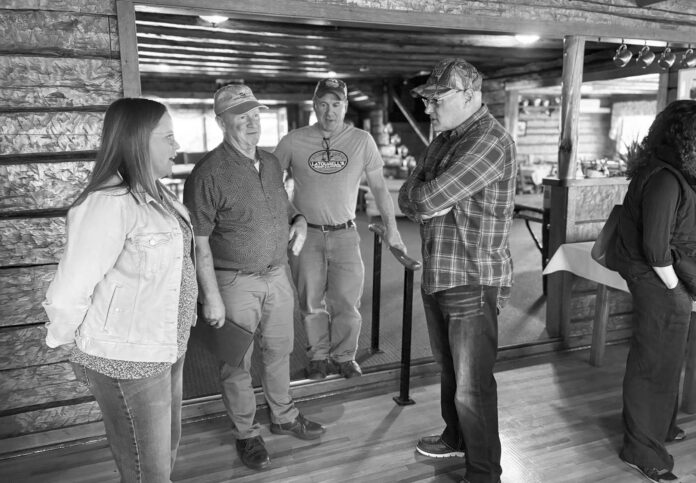By Joe Friedrichs
Paddle and Portage
CRANE LAKE – Nobody at the table knows what comes next.
A collection of politicians, business owners, and others interested in the future of the Remote Area Border Crossing (RABC) Program gathered around a large table at Nelson’s Resort on this large border lake Thursday, Sept. 25, prepared to share their concerns with the status and uncertainty of the permits issued under this longstanding policy. The RABC Program was “paused” by Canadian officials last September. It’s remained in limbo ever since.
“Minnesota and Canada both benefit from a healthy, reciprocal border crossing relationship,” said Congressman Pete Stauber, who organized and attended the meeting Thursday afternoon.
Last September, the Canadian government “paused the processing of new and renewal applications” for the RABC program that allows travelers to cross into certain remote parts of the Boundary Waters region. The permits are popular for people who paddle from Minnesota into Quetico Provincial Park in Ontario. The permits are also utilized by fishing guides and their guests, U.S. citizens who own property on lakes like Gunflint and Saganaga at the end of the Gunflint Trail, and Sand Point Lake near Nelson’s Resort, among others.
Guillaume Bérubé is the media relations manager for the Canada Border Services Agency (CBSA). He told Paddle and Portage (P&P) more than two months ago that the year-long review of the RABC Program “is progressing and we will be updating stakeholders upon its completion.”
P&P wrote to CBSA officials Sept. 25 seeking an update on the pause of RABC permits. Several hours later, Luke Reimer, a spokesperson for CBSA, wrote back, “Thank you for checking in. I don’t have a further update at this time but will let you know once I do.”
Unless this policy is changed in the months ahead, many snowmobilers, anglers, canoeists, and property owners on lakes at the end of the Gunflint Trail, numerous border lakes near Ely, and continuing west toward Rainy Lake, won’t be able to access Canadian border waters if their permit expires or if CBSA does not end the pause on processing new permits without first entering Canada through an official port of entry.
Stauber, who represents the Boundary Waters region in the U.S. House of Representatives, said before the meeting that, “Especially during the summer months, our shared border area is a hub of economic vitality as tourists from around the world look forward to visiting our shared wilderness and lake areas.”
Business owners and outfitters from the Gunflint Trail area to downtown Ely met with Stauber and District 3A Rep. Roger Skraba Thursday afternoon. Among those who attended the roundtable discussion was Donny Sorlie, the co-owner of Chippewa Inn on the Canadian side of Saganaga Lake near the end of the Gunflint Trail. Sorlie and his wife, Lisa, who was also in attendance, bought the Chippewa Inn in 2023.
“Without RABCs, if they shut this down, we’ll shut down,” Donny said. “One hundred percent.”
Others in attendance didn’t paint as bleak of a picture, as Chippewa Inn is the only business based on the Canadian side of a border lake. Nonetheless, they all echoed some version of this sentiment: Give us an answer.
“We want a timeline one way or the other,” said Ginny Nelson, a co-owner of Spirit of the Wilderness in Ely. “Even if that answer is that RABCs won’t be happening. We just need clarity.”
Blayne Hall is a co-owner of Williams & Hall Outfitters on Moose Lake near Ely. Hall said some 40 percent of his business relies on RABC permits being available. Similar to Nelson, the uncertainty of the situation is the most frustrating part of the scenario, Hall said.
“It’s not a matter of national security,” he said of the Canadians’ lack of public engagement throughout this year-long situation. “Just give us an answer.”
Though there was hope Canadian officials would be at the discussion Thursday afternoon, only one showed: Dani Fisher, a public affairs officer for Beth Richardson, Canada’s consul general in the Upper Midwest.
Fisher declined to be interviewed for this story, going so far as to say that anything she said during the roundtable, all of which was rather mundane and far from newsworthy, should not be described or quoted in any fashion.
Stauber collected sentiments from those gathered at the table and said he would be sending another letter to Canadian officials in the hopes CBSA, or anyone with the power to do so in Canada, will resolve the situation with RABC permits as soon as possible. Stauber told Paddle and Portage that he has not reached out to CBSA directly on this matter, as he wants to communicate through the “proper channels” of government.
Hall and others who attended Thursday’s meeting agreed that the bureaucrat-to-bureaucrat approach isn’t proving effective in resolving the RABC stalemate.
“This should be as simple as one person in Canada making a phone call to someone else in Canada and getting this straightened out,” he said.
Meanwhile, earlier this year, Canada extended some of the permits under the RABC Program. In a statement sent to Paddle and Portage in February, CBSA announced it “extended the validity of all permits issued after Sept. 1, 2023 to Dec. 31, 2025, at no charge to members. No action is required on the part of the permit holder, the existing permit will be accepted as valid until Dec. 31, 2025.”
With nobody from CBSA present at the discussion Thursday on the shores of Crane Lake, all the stakeholders and permit holders continue to guess as to what will happen to RABC permits for 2026 and beyond.
“Economically speaking, to (the Boundary Waters) and to Quetico, it’s a big deal to get this resolved,” said Bob LaTourell, a co-owner of LaTourell’s Resort and Moose Lake Outfitters near Ely.



